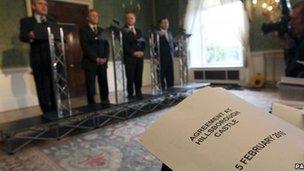Six months of justice left for Northern Ireland
- Published
- comments
Remember the marathon talks at Hillsborough Castle in January and February 2010? Those of us who got chilblains hanging around outside won't forget them in a hurry.
Gordon Brown, Brian Cowen and their ministers worked around the clock to ensure the peace process didn't run off the rails.
Finally, they brokered an agreement which led to the devolution of justice. In April that year David Ford was elected as the first local justice minister in nearly four decades.

The deal agreed at Hillsborough in 2010 runs out next May.
End of story? Well not quite, as the compromise agreed at Hillsborough was temporary - the legislation which underpins the current devolved justice department is due to expire in May next year. Theoretically the department will dissolve, and if the direct rulers did not return the prison gates could swing open.
During the assembly election the two main parties were asked about whether another crisis might be looming, and they indicated sorting out justice would be an urgent matter once they got back to work. However, with six months to go until the potential dissolution of the department we still don't know how the matter will be resolved.
The real horse trading is likely to happen between party leaders, but Stormont's Assembly Executive and Review Committee has been asked to formally review the options. The parties have submitted their preferences ahead of a committee meeting next week.
Sinn Fein and the SDLP want the justice job to be handed out like all the other portfolios, according to the d'Hondt proportional system. The Ulster Unionists say the review should provide an opportunity to reduce the number of Stormont departments.
The Greens say the position in which Alliance holds twice the number of departments as a party with double the number of MLAs is "undemocratic" and the appointment process should now be "normalised".
The DUP supports either continuing the current cross-community vote or bringing justice into the d'Hondt handout, under certain conditions. The DUP acknowledges that Alliance's two places in the executive "gives rise to unfairness" in comparison to the UUP and the SDLP. The party's submission says that any change should be subject to a reduction in the number and reorganisation of Stormont's departments.
Sensitive portfolio
Around the corridors at Stormont there has been a certain amount of chat about that reorganisation including merging the functions of the finance department with the First and Deputy First Minister's Office.
This would be consistent with the DUP's "Making Stormont Work Better, external" paper which talked about giving the First and Deputy First Minister's Office enhanced powers and didn't specifically mention finance in its proposed six to eight ministerial structure.
It would also have the obvious attraction to the DUP of resolving the dilemma facing the biggest party of whether it picks finance or justice first. This way the DUP could still retain a handle on financial matters, whilst ensuring they, not Sinn Fein, hold the sensitive justice portfolio.
However, there are downsides to the proposal. Would the notorious slowness of the OFMDFM in decision making infect whatever finance and personnel functions it might assume? Would such a department be able to produce a budget in a timely manner?
Either way the merger does not feature in the DUP submission, which is fairly sparse on detail.
Not surprisingly the current incumbents, Alliance, are most enthusiastic about continuing the current cross-community compromise. In order to deflect any potential criticism that they wish to hang on to justice for self-interest, the Alliance leader David Ford uses his submission to offer to resign or face a motion of no confidence in May next year, so the assembly can - if it wishes - elect a new minister.
Mr Ford clearly hopes MLAs will be happy to keep him on, but is trying to deflect criticism that, having got its hands on two departments, Alliance is unwilling to surrender any ministerial ground.